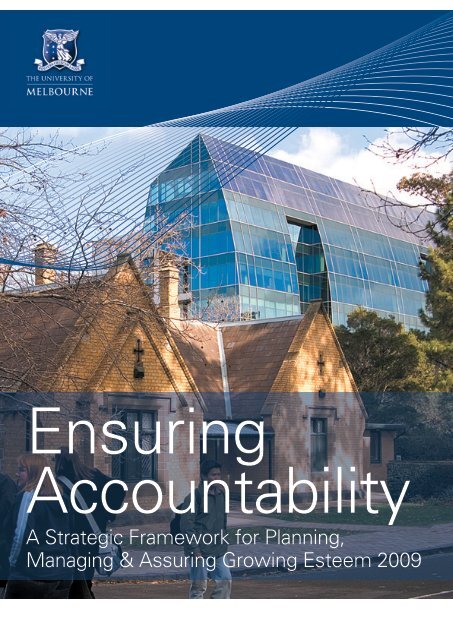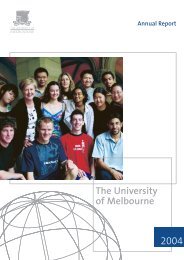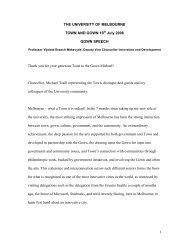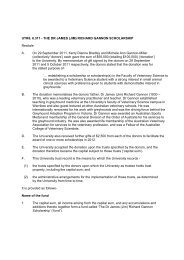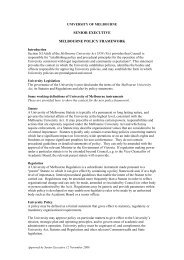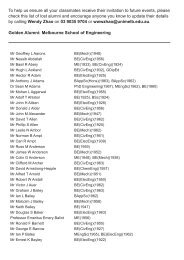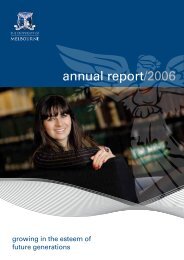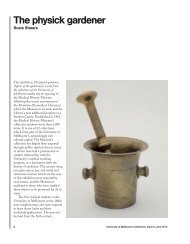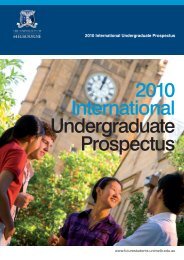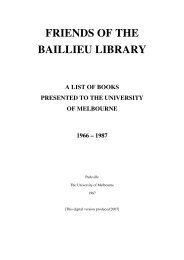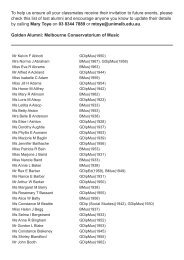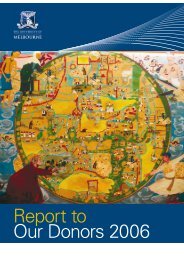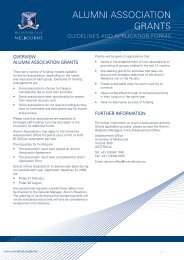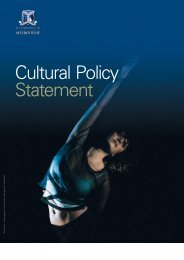Ensuring Accountability - University of Melbourne
Ensuring Accountability - University of Melbourne
Ensuring Accountability - University of Melbourne
You also want an ePaper? Increase the reach of your titles
YUMPU automatically turns print PDFs into web optimized ePapers that Google loves.
<strong>Ensuring</strong><br />
<strong>Accountability</strong><br />
A Strategic Framework for Planning,<br />
Managing & Assuring Growing Esteem 2009
Table <strong>of</strong> Contents<br />
1. Background 1<br />
2. Purpose 2<br />
3. <strong>Accountability</strong> Framework 3<br />
3.1. Principles and objectives 3<br />
3.2. Level 3<br />
3.3. Elements 4<br />
3.4. <strong>University</strong> accountabilities 5<br />
3.5. Management philosophy <strong>of</strong> subsidiarity 6<br />
4. <strong>Accountability</strong> Framework Governance 8<br />
5. Strategic Planning 9<br />
6. Business Planning and Budgeting 10<br />
6.1. Financial management 10<br />
6.2. Business planning 10<br />
6.3. Responsible Division Financial Management and Budgeting 11<br />
7. Performance Monitoring and Reporting 13<br />
7.1. External reporting 13<br />
7.2. Management reporting 14<br />
7.3. Student pr<strong>of</strong>ile reporting 15<br />
8. Risk Management 16<br />
8.1. Risk framework 16<br />
8.2. Risk management and compliance reporting 16<br />
9. Quality Assurance 17<br />
9.1. Quality assurance and standards 17<br />
9.2. Key <strong>University</strong> measures to demonstrate<br />
standards and outcomes 20<br />
<strong>Ensuring</strong> <strong>Accountability</strong> 21<br />
<strong>Ensuring</strong> <strong>Accountability</strong> draws from the <strong>Melbourne</strong> <strong>University</strong> Act 1958, the <strong>University</strong> Statutes &<br />
Regulations and relevant <strong>University</strong> policy documents. It is intended to function as a practical guide to the<br />
operation <strong>of</strong> the accountability framework for internal stakeholders, and to support external transparency<br />
and probity. Readers should refer to the current versions <strong>of</strong> governing legislation (including the Statutes<br />
& Regulations) for the <strong>University</strong>’s legal position. These documents are <strong>of</strong>ficially published in the<br />
<strong>University</strong> Calendar (www.unimelb.edu.au/unisec/calendar).
1. Background<br />
This document describes the annual cycle <strong>of</strong> planning, budgeting, reporting<br />
and quality assurance which operates in the <strong>University</strong> <strong>of</strong> <strong>Melbourne</strong>, and sets<br />
out the <strong>Accountability</strong> Structure through which the <strong>University</strong> <strong>of</strong> <strong>Melbourne</strong><br />
achieves its strategic goals and discharges its responsibilities to those to<br />
whom it is accountable. Through the <strong>Accountability</strong> Structure the <strong>University</strong> <strong>of</strong><br />
<strong>Melbourne</strong> adheres to proper processes for the governance and management<br />
<strong>of</strong> its affairs and seeks to ensure it meets its compliance obligations.<br />
The <strong>Accountability</strong> Structure is a coordinated annual program <strong>of</strong> corporate<br />
strategic planning, divisional business planning, budgeting and operational<br />
performance monitoring & reporting, quality assurance, and risk management.<br />
These activities are designed to ensure that, at <strong>University</strong>, faculty and graduate<br />
school, and divisional levels, the <strong>University</strong>’s various obligations are properly<br />
satisfied in a cost-effective and coordinated manner.<br />
Through effective accountability, a university not only<br />
meets important obligations to society, but is better able<br />
to achieve its academic mission. <strong>Ensuring</strong> <strong>Accountability</strong><br />
describes how the <strong>University</strong> <strong>of</strong> <strong>Melbourne</strong> fulfils its<br />
obligations to the people it serves—students and the<br />
community at large—and those who support it in various<br />
ways—staff, governments and taxpayers, alumni,<br />
donors, businesses and non-pr<strong>of</strong>it organizations.<br />
Pr<strong>of</strong>essor Glyn Davis, Vice-Chancellor<br />
<strong>Ensuring</strong> <strong>Accountability</strong>
2. Purpose<br />
The purpose <strong>of</strong> the accountability framework is to ensure that the <strong>University</strong>:<br />
• Achieves the strategic goals outlined in the Growing Esteem strategy which<br />
are guided by the principles outlined in The <strong>Melbourne</strong> Vision<br />
• Manages its various accountabilities to external stakeholders, in an effective<br />
and efficient manner: viz-<br />
– Regulatory<br />
– Compliance – demonstrating high levels <strong>of</strong> probity<br />
– Financial wellbeing<br />
– Social and community obligations<br />
• Maintains policies and processes which are systematic, cost-effective and<br />
well-integrated<br />
• Strives to secure excellent outcomes through adherence to rigorous<br />
internal processes<br />
The <strong>Melbourne</strong> Vision<br />
In pursuit <strong>of</strong> its vision to be a public-spirited institution highly regarded for its distinctive contributions to society, the<br />
<strong>University</strong> is guided by the following principles:<br />
• as a scholarly community, <strong>Melbourne</strong> will uphold the values <strong>of</strong> intellectual freedom, honesty, openness and rigour;<br />
• as a research institution, <strong>Melbourne</strong> will open new paths to understanding, support critical and creative endeavour<br />
and provide an outstanding research training experience for future leaders in academia, government and industry.<br />
<strong>Melbourne</strong> will continue to support a range <strong>of</strong> disciplines, while also directing additional funding towards disciplines <strong>of</strong><br />
strategic importance in which the <strong>University</strong> is currently, or might potentially be, a world-leader;<br />
• as a learning and teaching institution, <strong>Melbourne</strong> will seek out the brightest students from the widest range <strong>of</strong><br />
backgrounds. It will <strong>of</strong>fer an outstanding education designed to equip each new cohort to succeed in a globalised<br />
environment and define a future that they value;<br />
• as a public-spirited institution, <strong>Melbourne</strong> will ensure that its research, student learning and knowledge transfer<br />
programs serve public ends;<br />
• as an internationally engaged institution, <strong>Melbourne</strong> will work to meet global challenges with intelligence and<br />
ingenuity, while respecting cultural difference and common humanity. It will draw on the rich diversity <strong>of</strong> its staff and<br />
student body, strong relationships with local and international partner institutions, and an alumni network <strong>of</strong> talented<br />
graduates spread across the globe;<br />
• as a university with a strong sense <strong>of</strong> place, <strong>Melbourne</strong> will cherish its campus locale, set in a vibrant multi-cultural<br />
metropolis. Here face-to-face teaching will be the norm, scholars will gather from across the globe, and learning<br />
communities will enrich their work with evolving technologies; and<br />
• as an employer, <strong>Melbourne</strong> will strive for exemplary employment practices. <strong>Melbourne</strong> will strive to attract, retain<br />
and assist the pr<strong>of</strong>essional development <strong>of</strong> talented and diverse staff and will support the educational goals <strong>of</strong> an<br />
inclusive university.<br />
<br />
<strong>Ensuring</strong> <strong>Accountability</strong>
3. <strong>Accountability</strong> Framework<br />
3.1. Principles and objectives<br />
The following principles and objectives guide the operation <strong>of</strong> the<br />
accountability framework:<br />
• Enabling the <strong>University</strong> to achieve strategic goals<br />
• Attaining the most effective financial management to achieve these goals<br />
• <strong>Ensuring</strong> obligations are properly met<br />
• Providing justification for institutional autonomy<br />
• Encouraging continuous improvement at each university level<br />
• Single lines <strong>of</strong> accountability<br />
• Wherever possible, devolving responsibility to those operational units best<br />
able to determine the means <strong>of</strong> implementation to achieve successful and<br />
efficient outcomes<br />
3.2. Level<br />
<strong>Accountability</strong> is ensured through the following bodies and <strong>of</strong>ficers:<br />
• External accountability through <strong>University</strong> Council;<br />
• <strong>University</strong> management accountability through the Vice-Chancellor assisted<br />
by the Senior Executive;<br />
• Academic accountability through the Vice-Chancellor, Provost &<br />
Academic Board;<br />
• <strong>Accountability</strong> for overall business and administrative performance through<br />
the Senior Vice-Principal;<br />
• Faculty and Graduate School academic and management accountability<br />
through the Deans; and<br />
• Administrative divisional management accountability through the Senior<br />
Vice‐Principal.<br />
<strong>Ensuring</strong> <strong>Accountability</strong>
3.3. Elements<br />
The framework provides the mechanism for integrating the various elements<br />
into a credible and consistent set <strong>of</strong> systematic and transparent internal<br />
processes which demonstrates to external agencies accountability and high<br />
levels <strong>of</strong> probity.<br />
• Risk framework<br />
• Risk management &<br />
compliance reporting<br />
• <strong>University</strong> strategy<br />
• Portfolio strategic<br />
planning<br />
• Quality assurance<br />
and standards<br />
• Key measures<br />
Quality<br />
assurance<br />
and risk<br />
management<br />
Strategic<br />
planning<br />
Performance<br />
monitoring and<br />
reporting<br />
Business<br />
planning and<br />
budgeting<br />
• External reporting<br />
• Management reporting<br />
• Student pr<strong>of</strong>ile reporting<br />
• Financial management<br />
• Business planning<br />
• Responsible division<br />
management<br />
<br />
<strong>Ensuring</strong> <strong>Accountability</strong>
3.4. <strong>University</strong> accountabilities<br />
Council and its committees<br />
<strong>University</strong> Council is the peak governing body <strong>of</strong> the <strong>University</strong> responsible for<br />
approving the mission and strategic direction <strong>of</strong> the <strong>University</strong> and its annual<br />
budget and business plan, overseeing and reviewing the management <strong>of</strong> the<br />
<strong>University</strong> and its performance, approving and monitoring systems <strong>of</strong> control<br />
and accountability and appointing the Vice-Chancellor. Council is assisted in this<br />
responsibility through the work <strong>of</strong> committees appointed under the <strong>Melbourne</strong><br />
<strong>University</strong> Act <strong>of</strong> 1958.<br />
Academic Board and its committees<br />
Academic Board reports directly to the <strong>University</strong> Council. The Board’s<br />
function involves (1) the supervision and development <strong>of</strong> all academic activities<br />
including the maintenance <strong>of</strong> high standards in teaching and research and<br />
(2) communication with the academic community through the faculties and<br />
schools. The President <strong>of</strong> the Board, which is a two year elected position, is a<br />
member <strong>of</strong> the Senior Executive.<br />
Nature <strong>of</strong> management and leadership roles<br />
The Vice-Chancellor and Principal is the chief executive <strong>of</strong>ficer <strong>of</strong> the<br />
<strong>University</strong>. The Provost is the senior academic <strong>of</strong>ficer working with the<br />
Deans and Academic Board to achieve the academic vision embedded in<br />
the <strong>Melbourne</strong> Model (Statute 2.5.2). Subject to the ultimate accountability<br />
<strong>of</strong> Deans to the Vice-Chancellor, the Provost is the principal line manager for<br />
Deans on academic programs, academic staffing and, in conjunction with the<br />
Vice‐Chancellor, the achievement <strong>of</strong> overall faculty strategy and targets. The<br />
Provost and Deputy Vice-Chancellors are responsible for the major <strong>University</strong><br />
‘Triple Helix’ portfolios <strong>of</strong> research, learning and teaching and knowledge<br />
transfer. This oversight involves leading the strategic direction <strong>of</strong> the portfolio<br />
and engaging faculties and graduate schools in focussing activities towards<br />
achieving <strong>University</strong> strategy in areas for which they are accountable.<br />
The Senior Vice-Principal is responsible for high level strategic planning and<br />
resourcing advice to the Vice-Chancellor and the oversight <strong>of</strong> the university’s<br />
corporate operations. The Head <strong>of</strong> <strong>University</strong> Services is responsible for the<br />
day-to-day operation <strong>of</strong> key <strong>University</strong> services.<br />
Deans are appointed by Council for each Faculty and Graduate School (where<br />
established as a Faculty under Regulation 5.1R1). They are accountable for the<br />
educational, research, financial and administrative performance <strong>of</strong> the faculty<br />
(Statute 5.1.4).<br />
<strong>Ensuring</strong> <strong>Accountability</strong>
This philosophy<br />
is based on the<br />
principle that<br />
decisions should<br />
be taken as close<br />
as possible to<br />
where services<br />
are delivered and<br />
people affected.<br />
3.5. Management philosophy <strong>of</strong> subsidiarity<br />
Principle <strong>of</strong> subsidarity<br />
As a highly devolved institution the <strong>University</strong> seeks to secure its<br />
mission and strategic objectives through its various budget divisions. The<br />
<strong>University</strong> has adopted the concept <strong>of</strong> subsidiarity to denote its guiding<br />
organisational philosophy.<br />
This philosophy is based on the principle that decisions should be taken<br />
as close as possible to where services are delivered and people affected.<br />
It assumes that core academic and support functions and their supporting<br />
budgets should be located in faculties/graduate schools, given their need for<br />
innovation, speed, flexibility and personalised support. Some functions need to<br />
be grouped centrally for reasons <strong>of</strong> critical mass, access to scarce pr<strong>of</strong>essional<br />
services, risk management, policy consistency, high transaction costs, crosssubsidies<br />
and external representation. This assignment <strong>of</strong> responsibilities<br />
assumes effective financial management to achieve the goals <strong>of</strong> the <strong>University</strong>.<br />
Single lines <strong>of</strong> accountability<br />
The principle <strong>of</strong> subsidiarity also assumes single lines <strong>of</strong> accountability through<br />
the Vice-Chancellor. Senior <strong>of</strong>ficers rather than committees are assigned roles<br />
for achieving <strong>University</strong> targets and undertaking portfolio activities and service<br />
tasks. They are given the authority to make decisions and are held accountable<br />
for achieving agreed outcomes. The annual process <strong>of</strong> setting expectations<br />
and reviewing performance against key performance indicators for all members<br />
<strong>of</strong> the Senior Executive achieves alignment between individual manager and<br />
organisational objectives.<br />
Responsibilities for teaching, research and knowledge transfer<br />
(Statute 5.1)<br />
The development, operational control and quality <strong>of</strong> programs in research,<br />
and research training, learning and teaching and knowledge transfer, and the<br />
immediate services that support these activities are embedded within faculties<br />
and graduate schools, either directly or as assigned to custodial Deans (eg New<br />
Generation Degrees, Bio21 Institute).<br />
Responsibilities for administrative activities<br />
Responsible Division Management is a financial management approach with<br />
an underlying philosophy premised on (i) achievement <strong>of</strong> primary academic<br />
priorities, (ii) shifting the focus to a ‘full cost’ view <strong>of</strong> the operations,<br />
(iii) operational decentralisation and (iv) responsibility with overhead services to<br />
demonstrate value for money.<br />
<br />
<strong>Ensuring</strong> <strong>Accountability</strong>
In line with the philosophy <strong>of</strong> Responsible Division Management, administrative<br />
functions have been or are being devolved to divisions, except chancellery<br />
functions and common or mandated services that support faculties and<br />
graduate schools but for efficiency or consistency reasons are best shared.<br />
Chancellery functions include corporate governance, broad strategy and<br />
policy development, institutional quality control and identity through branding,<br />
external representation and compliance and accountability requirements,<br />
and areas in the which the <strong>University</strong> must ‘speak with one voice’ such as<br />
industrial relations.<br />
Senior Executive<br />
The Senior Executive is the <strong>University</strong>’s principal management committee.<br />
It acts under delegations from the Vice-Chancellor. Its membership comprises<br />
the Vice-Chancellor, the Provost, President <strong>of</strong> the Academic Board, the Senior<br />
Vice-Principal, other senior <strong>of</strong>ficers with significant portfolio responsibilities<br />
and Deans. The Committee is responsible for overseeing the development<br />
<strong>of</strong> <strong>University</strong> planning and budgeting and for monitoring performance against<br />
plans and budgets. In addition to providing advice to the Vice-Chancellor<br />
and other senior portfolio holders, the Committee has the VC’s delegated<br />
authority in a range <strong>of</strong> areas including approval <strong>of</strong> the student pr<strong>of</strong>ile,<br />
information technology policy, structural change, and significant changes in<br />
human resources policies. Terms <strong>of</strong> reference and current membership <strong>of</strong> the<br />
Senior Executive are maintained by the <strong>University</strong> Secretary’s Office<br />
(http://www.unimelb.edu.au/unisec/).<br />
External stakeholder relations are coordinated by the Vice-Chancellor and<br />
the Senior Vice-Principal. The Office <strong>of</strong> the Vice-Chancellor is responsible<br />
for managing political and strategic relationships. The Senior Vice‐Principal<br />
is responsible for coordinating <strong>of</strong>ficial <strong>University</strong> submissions and<br />
correspondence to government departments and other external agencies and<br />
bodies. In particular, the SVP oversees management <strong>of</strong> the relationship with<br />
the relevant Commonwealth Department responsible for funding universities<br />
and administering higher education policy.<br />
<strong>Ensuring</strong> <strong>Accountability</strong>
4. <strong>Accountability</strong> Framework<br />
Governance<br />
The coordination, implementation and monitoring <strong>of</strong> the effectiveness <strong>of</strong> the<br />
accountability framework is the responsibility <strong>of</strong> the Senior Vice-Principal,<br />
supported by the <strong>University</strong> Planning Office. The framework document is<br />
an <strong>of</strong>ficial publication <strong>of</strong> the <strong>University</strong> which describes in general terms the<br />
annual cycle <strong>of</strong> major activities. It is intended that the framework be reviewed<br />
and published every three years with minor updates as required. The Senior<br />
Executive is responsible for revising the framework and individual executives<br />
are responsible for the various activities. A timetable for the detailed Annual<br />
Cycle is approved in the third quarter <strong>of</strong> the prior year.<br />
Council<br />
Vice-Chancellor Senior Executive Academic Board<br />
Provost<br />
Risk Management<br />
Committee<br />
Undergraduate<br />
Programs Committee<br />
Deputy Vice-Chancellor<br />
Research<br />
Deputy Vice-Chancellor<br />
Global Relations<br />
IT Council<br />
<strong>Melbourne</strong> Model<br />
Committee<br />
Postgraduate<br />
Coursework Programs<br />
Committee<br />
Selection Procedures<br />
Committee<br />
Senior Vice-Principal<br />
Deans<br />
Teaching and Learning<br />
Quality Assurance<br />
Committee<br />
Teaching and Learning<br />
Development<br />
Committee<br />
Other Academic<br />
Committees<br />
<br />
<strong>Ensuring</strong> <strong>Accountability</strong>
5. Strategic Planning<br />
The Vice-Chancellor leads the development <strong>of</strong> <strong>University</strong> strategy and<br />
champions the discussion <strong>of</strong> strategic goals and new initiatives with the<br />
<strong>University</strong> community and stakeholders. The Office <strong>of</strong> the Vice-Chancellor is<br />
responsible for coordinating the strategic planning element <strong>of</strong> the framework.<br />
Major refinements <strong>of</strong> the strategic direction are undertaken approximately<br />
every three years, with annual updates incorporated in <strong>University</strong> Plans. For<br />
2009 the <strong>University</strong> Plan will again build on its predecessors – the Strategic<br />
Plan from 2006 and the <strong>University</strong> Plans for 2007 and 2008. Early in 2009 there<br />
will be a revision <strong>of</strong> the strategic plan expected to canvas more substantive<br />
changes, including responding to external policy reforms announced in the<br />
Commonwealth reviews and the global financial position. Growing Esteem<br />
Mark II will be introduced from 2010.<br />
Complementing portfolio plans are developed by the Provost and Deputy<br />
Vice‐Chancellors to set more specific direction within their respective program<br />
areas for periods up to three years.<br />
The <strong>University</strong> undertakes annual strategic reviews in the first quarter <strong>of</strong><br />
each year. This corporate level reflection precedes and provides the context<br />
for detailed divisional business planning which is undertaken in the second<br />
quarter. <strong>University</strong>-level strategic goals and planning parameters can then<br />
inform divisional planning, including strategic, academic and financial planning.<br />
In February <strong>of</strong> each year a Conference <strong>of</strong> Deans and Heads <strong>of</strong> Departments<br />
is held to consider strategic issues for the current and following year. This<br />
is followed by a Council Planning Conference at which Council members<br />
confer to ensure that the <strong>University</strong>’s strategic direction is reviewed and<br />
‘fine-tuned’, taking into consideration performance and operational priorities.<br />
These conferences allow strategic priorities, goals and directions to evolve<br />
with changing circumstances, but at the same time preserving an underlying<br />
strategic continuity.<br />
As an important input into the strategic review process, the Provost and<br />
Deputy Vice-Chancellors undertake, in areas specific to their portfolios,<br />
performance reviews and strategic discussions with faculties and schools<br />
during the first quarter. Academic Board may provide advice on academic<br />
standards and other academic matters as part <strong>of</strong> the review process.<br />
The annual planning and budget conference has the responsibility <strong>of</strong><br />
determining the financial direction and budget issues that set the next year’s<br />
budget and the three year forecast.<br />
<strong>Ensuring</strong> <strong>Accountability</strong>
6. Business Planning and Budgeting<br />
The accountability framework assists<br />
senior executives in attaining the<br />
most effective business management<br />
(financial and non-financial) to achieve<br />
the <strong>University</strong>’s strategic goals and to<br />
ensure high quality outcomes.<br />
6.1. Financial management<br />
The Finance Committee exercises governance responsibilities in the oversight<br />
<strong>of</strong> the <strong>University</strong>’s financial and business affairs and, within delegated authority,<br />
acts on behalf <strong>of</strong> the Council on these matters. It advises Council on financial<br />
matters recommends the annual budget for approval to Council and, once<br />
approved, exercises governance oversight <strong>of</strong> performance against Budget.<br />
The Senior Executive is responsible to the Vice-Chancellor for the financial<br />
management <strong>of</strong> the <strong>University</strong>. It oversees the development <strong>of</strong> university<br />
planning and budgeting and once approved, for monitoring performance against<br />
plans and budgets. The Senior Vice-Principal has a key responsibility for high<br />
level strategic planning and resourcing advice to the Vice-Chancellor, the<br />
preparation <strong>of</strong> the annual Budget, Student Pr<strong>of</strong>ile and Capital Program and the<br />
oversight <strong>of</strong> the <strong>University</strong>’s corporate operations.<br />
6.2. Business planning<br />
Formal divisional business planning was introduced in 2007, driven by the<br />
need to assure that implementation <strong>of</strong> Growing Esteem could be achieved<br />
and managed. Business planning is now part <strong>of</strong> the annual cycle <strong>of</strong> planning,<br />
budgeting and review. The Business Plan is a division’s core planning<br />
document by which it generates a shared understanding within the division<br />
(and its constituent units) <strong>of</strong> future directions and priorities, and the means<br />
by which they are to be achieved. The Business Plan is also the key vehicle<br />
by which the division seeks to secure a shared understanding within the<br />
<strong>University</strong> <strong>of</strong> the robustness <strong>of</strong> its strategy, innovative activities, planning<br />
process, performance outcomes, financial viability and management <strong>of</strong> risk.<br />
It also provides a direct link between Plans (aspiration) and Budgets (capacity).<br />
The business plan is the basis on which the annual budget <strong>of</strong> each division is<br />
agreed. As a core divisional planning document, these business plans are a<br />
medium term document which would have a significant update approximately<br />
every three years, with minor annual updates. Divisional Plans are informed<br />
by top down directions and parameters set in the <strong>University</strong>’s Strategic Plan<br />
and represent a division’s more local response to opportunities and challenges.<br />
The plan is a key mechanism <strong>of</strong> accountability within a devolved ‘Responsible<br />
Division Management” (RDM) setting.<br />
Bottom-up input from divisional plans are also a critical base on which the<br />
<strong>University</strong>’s Rolling Five Year Financial Plan is prepared. These plans also<br />
provide an important integration point for recurrent and capital planning and<br />
budgeting at the divisional and <strong>University</strong> level. Effective business planning<br />
provides longer financial horizons needed to give effect to the significant<br />
transition underway. The aim is to achieve greater coordination <strong>of</strong> teaching<br />
programs required under the <strong>Melbourne</strong> Model reforms. For research, the<br />
intention is to concentrate new resources in fewer cross-disciplinary programs.<br />
In Knowledge Transfer, the plans provide an important co-ordination point for<br />
the wide range <strong>of</strong> activities that fall under this strand, and for integrating these<br />
activities with teaching and research.<br />
10<br />
<strong>Ensuring</strong> <strong>Accountability</strong>
6.3. Responsible Division Financial<br />
Management and Budgeting<br />
From 2009 a new approach is being taken to <strong>University</strong> budgeting & financial<br />
management so as to give effect to the principle <strong>of</strong> subsidiarity. It involves<br />
the introduction <strong>of</strong> responsible division budgeting. The underlying philosophy<br />
is a focus on operational decentralization and supporting the achievement <strong>of</strong><br />
academic priorities. Under RDM, the Budget is allocated as transparently as<br />
possible, with strategic priorities being cross subsidized where necessary and<br />
authority aligned with responsibilities.<br />
The intended outcomes from this approach are:<br />
• Integrated budget management with business planning;<br />
• Provide greater flexibility to achieve strategic goals;<br />
• Single lines <strong>of</strong> accountability – increased responsibility and accountability for<br />
heads <strong>of</strong> budget divisions;<br />
• Placing the <strong>University</strong> on a more viable financial footing;<br />
• Simpler budgeting with more rigorous financial reporting and performance<br />
measurement; and<br />
• Encouraging broader understanding <strong>of</strong> <strong>University</strong> finances through<br />
fully‐costed support services.<br />
The general characteristics <strong>of</strong> Responsible Division Management are:<br />
• Academic divisions are allocated and manage the revenues they generate;<br />
• Academic divisions are responsible for funding the service centres that<br />
support them;<br />
• Levies are applied to create a subvention pool to fund areas that are unable<br />
to generate sufficient resources to finance their operations;<br />
• Academic divisions contribute to direct costs on a user-pays basis and to<br />
indirect costs on a basis <strong>of</strong> expenditure drivers; and<br />
• Administrative/support divisions receive funds on the basis <strong>of</strong> an agreed<br />
service catalogue and service delivery targets and are accountable for<br />
demonstrating value for money (efficiency and effectiveness).<br />
The <strong>University</strong>’s budget principles and model are intended to:<br />
• Provide for strategic university investment;<br />
• Be transparent, without undue complexity;<br />
• Support the management philosophies <strong>of</strong> subsidiarity and single lines<br />
<strong>of</strong> accountability;<br />
• Be plan-driven and incentive-based, providing reward for good performance,<br />
both in relation to revenue growth and cost efficiency;<br />
<strong>Ensuring</strong> <strong>Accountability</strong> 11
• Where practicable, calculate charges on the basis <strong>of</strong> services consumed or<br />
expenditure drivers capable <strong>of</strong> being validated as providing value for money;<br />
• Provide for whole <strong>of</strong> project life cycle funding for major infrastructure<br />
projects and programs;<br />
• Provide any cross-subsidisation on the basis <strong>of</strong> substantiated need and<br />
regular review;<br />
• Make apparent the level <strong>of</strong> and over time reduce the reliance on<br />
cross‐subsidisation <strong>of</strong> recurrent programs from investment or other<br />
non‐recurrent revenue; and<br />
• Be complemented by rigorous financial reporting and oversight<br />
An annual Planning and Budget Conference is held early in the 3rd<br />
quarter <strong>of</strong> each year to draft a plan-driven, incentive-based budget for the<br />
following year and budget projections for the ensuing triennium. At this<br />
conference, budget proposals from each major budget division are evaluated by<br />
the Vice‐Chancellor, Deans, Academic Board <strong>of</strong>ficers, student representatives<br />
and academic and administrative executives. Allocations are proposed for the<br />
following rolling three year budgets through determination <strong>of</strong> a one year budget<br />
plus forward estimates for a further two years.<br />
Capital and infrastructure planning and budgeting<br />
The ten year rolling infrastructure program provides a clear capital plan<br />
against which the operating budget is framed. The budget model being<br />
introduced from 2009 has separate but clearly identified allocations for<br />
capital infrastructure and facilities services. The Planning and Budget<br />
Conference reviews and considers funding proposals for the annual Capital<br />
and Infrastructure Plan and other major items <strong>of</strong> <strong>University</strong> expenditure. The<br />
aim is to achieve full life cycle funding <strong>of</strong> major projects and to provide greater<br />
transparency in the capital planning process.<br />
Divisional budgets<br />
Following the Planning & Budget Conference, Divisions prepare detailed<br />
budgets and once finalised by the Senior Vice‐Principal, are submitted for<br />
approval to the <strong>University</strong> Council via Finance Committee.<br />
Budget approval<br />
To ensure congruity between planning and resource allocation, Council<br />
considers the <strong>University</strong> Budget and the <strong>University</strong> Plan at the same time. Any<br />
significant subsequent variations to budget revenue expectations are reported<br />
through Finance Committee to Council.<br />
12<br />
<strong>Ensuring</strong> <strong>Accountability</strong>
7. Performance Monitoring<br />
and Reporting<br />
Good governance and management demand exemplary standards <strong>of</strong><br />
accountability. <strong>Accountability</strong> entails not only the external reporting to the State<br />
and Federal Governments in satisfaction <strong>of</strong> the obligations pursuant to which<br />
the <strong>University</strong> has been established or receives funding, but also the internal<br />
monitoring <strong>of</strong> performance against <strong>University</strong> and divisional plans and budget,<br />
and compliance with <strong>University</strong> policy. Priority is being given to strengthening<br />
performance monitoring and management reporting. The aim is to ensure<br />
effective decision making that is evidence based and directed to achieving the<br />
<strong>University</strong>’s mission and strategic goals.<br />
The performance monitoring and reporting element <strong>of</strong> the Framework ensures<br />
that reporting accountabilities are carried out in a timely and co-ordinated<br />
manner that seeks to avoid inefficiency through duplication <strong>of</strong> effort and<br />
promotes effectiveness by ensuring that the monitoring <strong>of</strong> past performance<br />
feeds into current business planning and budgeting.<br />
7.1. External reporting<br />
The main external accountabilities for the <strong>University</strong> are the Annual Report,<br />
including the financial accounts, to be submitted to the State Government<br />
for tabling in the Victorian Parliament and the annual Funding Agreement<br />
and Institution Assessment Framework documentation required by the<br />
Commonwealth Government.<br />
The key activities <strong>of</strong> external reporting comprise:<br />
• Preparation <strong>of</strong> the Annual Report and its accompanying financial statements.<br />
These are submitted to Council for approval in March. In the case <strong>of</strong> the<br />
annual accounts, these are prepared by the Chief Financial Officer, with<br />
Finance Committee responsible to Council for recommending their adoption<br />
and does so only after receiving certifications <strong>of</strong> compliance from senior<br />
<strong>University</strong> <strong>of</strong>ficers;<br />
• Commonwealth higher education and research reporting including higher<br />
education statistical collections and Higher Education Contribution Scheme<br />
(HECS) liability reporting;<br />
• Other grant acquittal and reporting, eg competitive ARC and NMHRC grant<br />
and program funding, other State and Federal grants;<br />
• Negotiation with Commonwealth over the terms <strong>of</strong> the <strong>University</strong>’s annual<br />
Funding Agreement. The Funding Agreement, subsequently approved by<br />
the Minister and tabled in the Commonwealth Parliament, determines the<br />
level <strong>of</strong> funding to be received for the <strong>University</strong>’s Government-subsidised<br />
coursework programs and the conditions on which that funding is provided.<br />
Key elements <strong>of</strong> the <strong>University</strong>’s reporting cycle, in particular the monitoring<br />
<strong>of</strong> the student pr<strong>of</strong>ile, are undertaken at times that enable <strong>University</strong> <strong>of</strong>ficers<br />
to engage in the Funding Agreement negotiations in a manner that is as well<br />
informed as possible about current performance and future intentions;<br />
<strong>Ensuring</strong> <strong>Accountability</strong> 13
• Preparation <strong>of</strong> the <strong>University</strong>’s annual Institution Assessment Framework<br />
submission to the Commonwealth. The Institution Assessment Framework<br />
constitutes the Commonwealth Government’s assessment <strong>of</strong> the<br />
<strong>University</strong>’s performance in four key areas: organisational sustainability;<br />
achievements in higher education provision; quality <strong>of</strong> outcomes; and<br />
legislative and program compliance; and<br />
• Demonstrating high quality outcomes and process through a cycle <strong>of</strong><br />
quality audits conducted by the national Australian Universities Quality<br />
Agency (AUQA).<br />
7.2. Management reporting<br />
Management reporting is being strengthened with the introduction <strong>of</strong><br />
a Management Information System (MIS) and a standardised reporting<br />
framework for all key aspects <strong>of</strong> the <strong>University</strong>’s core operational performance.<br />
This system will have the following objectives:<br />
• Provision <strong>of</strong> reporting in a form that meets the requirements <strong>of</strong> the four key<br />
levels <strong>of</strong> university governance and management: Council, Senior Executive,<br />
Faculty Executive and Department/School Executive.<br />
• Timely reports – monthly or the latest available. A detailed reporting calendar<br />
will operate from 2009 to help communicate when key information will<br />
become available;<br />
• Coverage <strong>of</strong> both financial and key non-financial (business driver) information.<br />
Business drivers include pr<strong>of</strong>ile information on teaching, research, research<br />
training, knowledge transfer, staff, infrastructure, national and international<br />
benchmarking;<br />
The key activities <strong>of</strong> management reporting and performance<br />
monitoring comprise:<br />
• Annual Council Planning Conference in February, where Council members<br />
formally review a report on <strong>University</strong> performance against targets in<br />
the <strong>University</strong> Plan and consider the implications <strong>of</strong> that performance for<br />
the current cycle <strong>of</strong> planning. The Council also receives reports on key<br />
performance indicators The <strong>Melbourne</strong> Scoreboard and Performance Report<br />
which benchmark university performance against national and international<br />
outcomes, and show trend data. Following Council consideration, these<br />
reports are distributed widely within the <strong>University</strong>;<br />
• Annual divisional Strategy and Performance Review (SPR) in which the Vice-<br />
Chancellor and Senior Vice-Principal, assisted by senior <strong>University</strong> colleagues<br />
including Academic Board <strong>of</strong>ficers and Deans, carry out an in-depth appraisal<br />
<strong>of</strong> the performance <strong>of</strong> academic and administrative divisions. For each<br />
budget division a core set <strong>of</strong> performance indicators embracing research,<br />
teaching and learning, student pr<strong>of</strong>ile and resource management is used<br />
to assess performance and set the context for the discussion on strategic<br />
14<br />
<strong>Ensuring</strong> <strong>Accountability</strong>
directions. The review also provides an important review point for updated<br />
business plans and financial projections. A report and recommendations<br />
from the Strategy and Performance Review are used to inform and align the<br />
annual budget. The review meeting is an important point in the accountability<br />
<strong>of</strong> the Dean and senior faculty team. SPR outcomes and recommendations<br />
are also formally reported to the Academic Board and Council;<br />
• Taking Stock is a summary mid-year audit <strong>of</strong> the <strong>University</strong>’s performance<br />
presented by the Vice-Chancellor to Council and members <strong>of</strong> the Committee<br />
<strong>of</strong> Convocation and Academic Board;<br />
• Regular monitoring by Finance Committee <strong>of</strong> the financial performance <strong>of</strong><br />
the <strong>University</strong> and its auxiliary operations and controlled entities. Finance<br />
Committee also oversees external credit rating and lending institutions<br />
requirements;<br />
• Regular monitoring by senior managers and the Senior Executive <strong>of</strong> the<br />
performance (financial and non-financial) <strong>of</strong> divisions;<br />
• Annual monitoring by the Academic Board <strong>of</strong> <strong>University</strong> performance in the<br />
selection <strong>of</strong> students into courses, including selection into special entry<br />
programs; and<br />
• Structured program <strong>of</strong> annual appraisals and formal feedback process with<br />
regular monitoring <strong>of</strong> performance against agreed individual performance<br />
targets through which Deans and other senior managers are held<br />
accountable for their performance.<br />
7.3. Student pr<strong>of</strong>ile reporting<br />
• Reporting to external agencies, pr<strong>of</strong>essional bodies, accrediting<br />
organisations, and stakeholder groups is regularly undertaken at <strong>University</strong><br />
and divisional level; and<br />
• Learning and Teaching Performance Fund: The Commonwealth provides<br />
funding to institutions on the basis <strong>of</strong> performance in learning and teaching<br />
for undergraduates. From 2009 the LTPF will reward improvement as well<br />
as excellence. The seven measures used in the LTPF are based on statistical<br />
data collections and student feedback surveys undertaken by universities<br />
and submitted to the Commonwealth.<br />
<strong>Ensuring</strong> <strong>Accountability</strong> 15
8. Risk Management<br />
8.1. Risk framework<br />
Identifying and managing risk is an<br />
inherent management responsibility<br />
within any large and complex<br />
organisation. At the <strong>University</strong><br />
<strong>of</strong> <strong>Melbourne</strong> faculties and<br />
administrative divisions undertake<br />
on an annual basis a strategic risk<br />
assessment as part <strong>of</strong> the divisional<br />
business planning process. Risk<br />
management is a core responsibility<br />
<strong>of</strong> senior managers. The risk pr<strong>of</strong>ile<br />
and management reports that<br />
result from such assessments are<br />
integrated into a <strong>University</strong> risk<br />
assessment which is reported<br />
regularly to Council through its Risk<br />
Management and Audit and Risk<br />
Committees. A risk management<br />
framework has been approved<br />
by Council and a risk information<br />
webpage is available http://www.<br />
upo.unimelb.edu.au/StratRisk_<br />
Management.html<br />
8.2. Risk management and<br />
compliance reporting<br />
At governance level, the Finance Committee has oversight on the <strong>University</strong>’s<br />
financial position and risks, assuring that due financial processes and probity<br />
are carried out and that the <strong>University</strong> is fully compliant with legislative and<br />
government requirements. The Audit and Risk Committee provides advice<br />
to Council and the Finance Committee on all matters pertaining to financial<br />
audits, management audits and reviews. The Committee also advises on<br />
the appropriate governance and risk management structures and processes,<br />
and the effectiveness <strong>of</strong> risk management controls. The regular reporting to<br />
Council on compliance issues by the Compliance Officer is another important<br />
monitoring process. Legislation and Trusts Committee has an important<br />
oversight <strong>of</strong> trusts.<br />
At the management level, risks are monitored at various levels as shown, with<br />
the Australian Risk Management Standard 4360 being followed:<br />
• <strong>University</strong>-Wide Strategic Risks<br />
Senior executives are responsible for the effective management <strong>of</strong><br />
<strong>University</strong>-wide risks, with the Risk Management Committee having an<br />
oversight and monitoring role.<br />
• Divisional Strategic Risks<br />
Deans and division heads are responsible for the effective management<br />
<strong>of</strong> divisional risks, with the business plan being the key vehicle for<br />
demonstrating effective mitigation strategies to manage these risks. These<br />
risks and their management controls are reviewed twice a year by the Risk<br />
Management Committee.<br />
• Operational Risks<br />
The Administrative Policy and Practices Group have the on-going role to<br />
ensure that operational risks <strong>of</strong> <strong>University</strong>-wide services are well managed,<br />
with the accountable Head <strong>of</strong> Division being responsible for the quarterly<br />
review. Quarterly reports are received by the Risk Management Committee.<br />
• Specialist Risks<br />
The <strong>University</strong> has dedicated risk program managers who are responsible<br />
for ensuring effective <strong>University</strong>-wide programs are in place for controlling<br />
specialist risks – Environmental Health and Safety, Biosafety, Insurance,<br />
WorkCover, IT and Information Services, Business Continuity Planning, and<br />
Crisis Management and Emergency Management Planning. Quarterly reports<br />
are received by the Risk Management Committee.<br />
16<br />
<strong>Ensuring</strong> <strong>Accountability</strong>
9. Quality Assurance<br />
The <strong>University</strong> <strong>of</strong> <strong>Melbourne</strong> seeks to<br />
conduct a comprehensive, integrated<br />
program <strong>of</strong> quality assurance that<br />
is tailored to its own particular<br />
needs yet satisfies the reasonable<br />
expectations <strong>of</strong> external quality<br />
review agencies. Quality assurance<br />
embraces the triple helix and the<br />
enablers (support services, systems<br />
and infrastructure):<br />
• Learning and teaching<br />
• Research and research training<br />
• Knowledge transfer<br />
• Enablers – support services,<br />
systems and infrastructure<br />
9.1. Quality assurance and standards<br />
The <strong>University</strong> is committed to ensuring that its internal quality assurance<br />
programs are able to validate the extent <strong>of</strong> progress towards the fulfilment<br />
<strong>of</strong> its mission at <strong>University</strong>, faculty/graduate school, academic unit and<br />
administrative unit levels. The <strong>University</strong> also undertakes its quality assurance<br />
activities in a manner that obviates, to the greatest level possible, the need for<br />
re-work or duplicated effort in order to meet external reporting obligations.<br />
At a time <strong>of</strong> major change with the implementation <strong>of</strong> the Growing Esteem<br />
strategic agenda and the <strong>Melbourne</strong> Model it will be crucial to demonstrate<br />
that the <strong>University</strong> continues to achieve excellent outcomes and that its<br />
processes are exemplary, fair and transparent. Overall, the aim is to provide<br />
<strong>University</strong> Council, the Vice-Chancellor, Deans, Heads <strong>of</strong> Department and<br />
senior managers with systematic feedback on the performance <strong>of</strong> the<br />
programs for which they are responsible and to promote a culture <strong>of</strong> rigorous<br />
self-analysis and review from which continuous improvement initiatives are<br />
identified and implemented.<br />
Quality assurance needs to demonstrate that:<br />
• Outcomes are <strong>of</strong> a high standard and strategic goals are achieved<br />
• Processes are consistent and fair and enable these excellent outcomes<br />
Quality assurance processes include for:<br />
A. Learning and Teaching, Research and Research Training and<br />
Knowledge Transfer<br />
• National and international benchmarking to demonstrate high<br />
standards<br />
• Performance monitoring at <strong>University</strong>, faculty/school, and academic<br />
unit level<br />
• Self assessment <strong>of</strong> performance within faculties and graduate schools<br />
as part <strong>of</strong> their business planning process<br />
• Academic reviews<br />
– Course reviews<br />
– Curriculum and Discipline reviews<br />
• Pr<strong>of</strong>essional accreditation at national and international levels<br />
• Academic department/school audits<br />
A rolling program <strong>of</strong> academic department/school audits reviews reporting<br />
through to the annual Strategy and Performance Review ensures that<br />
heads <strong>of</strong> academic units have the opportunity to demonstrate to the<br />
wider <strong>University</strong> community the value <strong>of</strong> their activities and the validity <strong>of</strong><br />
their processes.<br />
<strong>Ensuring</strong> <strong>Accountability</strong> 17
• Stakeholder feedback – Evaluation program<br />
A key feature <strong>of</strong> the quality assurance cycle is a systematic evaluation<br />
program through which key constituencies are surveyed to provide feedback<br />
on the quality <strong>of</strong> the <strong>University</strong> programs, services or outcomes in which<br />
they have a particular interest. Through this matrix <strong>of</strong> evaluation:<br />
– students enrolled in coursework programs are surveyed towards the end<br />
<strong>of</strong> each teaching period to provide feedback on their perceptions <strong>of</strong> the<br />
teaching and learning experience provided in each <strong>of</strong> the subjects in which<br />
they have been enrolled in a survey titled Quality <strong>of</strong> Teaching;<br />
– various cohorts <strong>of</strong> students are surveyed each year to provide feedback on<br />
their overall experience at the <strong>University</strong> in a survey titled the <strong>Melbourne</strong><br />
Experience Survey;<br />
– International students are surveyed periodically by the <strong>University</strong> and<br />
national agencies;<br />
– Research higher degree students are surveyed to provide feedback on<br />
the quality <strong>of</strong> research supervision and departmental support <strong>of</strong> their<br />
research candidature. Feedback from this survey is supplemented by the<br />
<strong>University</strong> <strong>of</strong> <strong>Melbourne</strong>’s participation in the Commonwealth-sponsored<br />
Postgraduate Research Experience Questionnaire;<br />
– Graduates are surveyed, both immediately after graduation through the<br />
Graduate Career Council <strong>of</strong> Australia’s Course Experience Questionnaire<br />
and periodically some years after graduation by the <strong>University</strong>, to gauge<br />
perceptions <strong>of</strong> their course and the “<strong>Melbourne</strong> student experience”;<br />
– Stakeholders including employers are surveyed from time to time to<br />
provide feedback on the quality <strong>of</strong> <strong>Melbourne</strong> graduates; and<br />
– Staff surveys are conducted from time to time including pulse surveys,<br />
engagement surveys and feedback on management<br />
The conduct <strong>of</strong> this program <strong>of</strong> evaluation on a regular and systematic basis<br />
provides valuable trend data to monitor progress in continuous improvement<br />
activities. A commitment to reporting to the Academic Board and Council on<br />
the outcomes <strong>of</strong> the evaluation surveys and the action proposed in response<br />
to survey findings ensures that academic managers are held accountable<br />
for initiating actions that will result in improved outcomes in areas identified<br />
as requiring improvement. A Surveys Reference Group has also been<br />
established to provide policy, co-ordination and quality assurance in respect <strong>of</strong><br />
surveys conducted within the <strong>University</strong>.<br />
http://www.upo.unimelb.edu.au/Public/Pol_Ext/Uni_Surveys.html<br />
18<br />
<strong>Ensuring</strong> <strong>Accountability</strong>
B. Enablers – Administrative and Support Services<br />
Managing the service improvement process and ensuring that risks are well<br />
managed are crucial components <strong>of</strong> the <strong>University</strong>’s quality assurance and<br />
evaluation <strong>of</strong> administrative and support services. Benefits <strong>of</strong> responsible<br />
division management are clearer lines <strong>of</strong> responsibility and accountability,<br />
removal <strong>of</strong> duplication, greater responsiveness or client focus and<br />
reduced cost.<br />
With the move to portfolio programs and responsible division accountability and<br />
budgeting, quality assurance process will also address outcomes and standards<br />
from university-wide programs <strong>of</strong> activities and functions such as:<br />
• Student services and student centres<br />
• Student enrichment and engagement<br />
• Marketing and recruitment<br />
• Infrastructure and facilities services<br />
• Corporate services<br />
Current quality assurance processes include:<br />
Service Program and administrative department audits<br />
Periodic service program reviews and administrative department reviews, both<br />
reporting through to the Senior Vice-Principal ensures that senior administrators<br />
have the opportunity to demonstrate to faculties and graduate schools that<br />
designated services are being delivered at the agreed level.<br />
Stakeholder feedback – Evaluation program<br />
• Senior academic and administrative managers provide feedback on the<br />
quality <strong>of</strong> <strong>University</strong> management and services. The current instrument is<br />
titled Quality <strong>of</strong> <strong>University</strong> Management and Administration (QUMA);<br />
• Staff surveys are conducted from time to time including pulse surveys,<br />
engagement surveys and feedback on management<br />
Industry Standards and <strong>University</strong> Benchmark Comparative<br />
Performance Data<br />
Services benchmark their cost effectiveness and value for money by comparing<br />
<strong>Melbourne</strong>’s performance with industry standards and university sector<br />
benchmarking data.<br />
<strong>Ensuring</strong> <strong>Accountability</strong> 19
9.2. Key <strong>University</strong> measures to demonstrate standards and outcomes<br />
Key <strong>University</strong> performance measures are a means <strong>of</strong> demonstrating in a quantitative way the achievement <strong>of</strong> strategic<br />
goals, maintenance <strong>of</strong> high academic standards and quality outcomes. Key <strong>University</strong> performance measures will need<br />
to be finalised but core indicators are listed below:<br />
Quality Standard<br />
Measure<br />
Triple Helix<br />
(1) Top GO8 university for Course Experience Questionnaire<br />
(CEQ) outcomes<br />
(2) Graduate Destination Survey (GDS) well above state<br />
average<br />
CEQ Overall Standing<br />
GDS FT Employment<br />
(3) In top national cohort for learning & teaching performance LTPF top cohort<br />
(4) High proportion <strong>of</strong> students positive about the <strong>Melbourne</strong><br />
experience<br />
<strong>Melbourne</strong> Experience Survey student feedback<br />
(5) Strong international student pr<strong>of</strong>ile % and mix <strong>of</strong> international students<br />
(6) Strong equity student pr<strong>of</strong>ile, addressing individual and<br />
systematic disadvantage<br />
number <strong>of</strong> low SES equity students by increasing<br />
proportion from under represented schools<br />
(7) Top national PG Coursework pr<strong>of</strong>ile increase per annum with aim <strong>of</strong> trebling numbers<br />
over three years<br />
(8) 70% <strong>of</strong> disciplines in the Top 2 <strong>of</strong> the nation for research<br />
performance<br />
Williams benchmark project<br />
(9) Top national competitive grant performer NCG leader<br />
(10) Citations national leader in a proportion <strong>of</strong> disciplines Thomson’s citation discipline rankings<br />
(11) Quality staff Research excellence measure<br />
(12) Research training national leader Top rank in RHD completions<br />
(13) Top international standing Increasing performance in international rankings<br />
Enablers<br />
(14) Top quality resources to support academic outcomes Unit <strong>of</strong> Resource increasing % pa<br />
(15) Credit strength Standard & Poor’s credit rating<br />
(16) Diversity <strong>of</strong> funding sources Mixed portfolio<br />
(17) Advancement revenue National leader with % increase per annum<br />
(18) Sustainability Reduction in electricity and water use<br />
20<br />
<strong>Ensuring</strong> <strong>Accountability</strong>
<strong>Ensuring</strong> <strong>Accountability</strong><br />
A Strategic Framework for Planning, Managing<br />
& Assuring Growing Esteem<br />
Date Activity Key Body Officer Responsible<br />
January<br />
(1) Preparation <strong>of</strong> Annual Report, <strong>University</strong><br />
Performance Report and performance against<br />
<strong>University</strong> Plan targets.<br />
(2) Preparation <strong>of</strong> Annual Accounts.<br />
(3) Annual Certification <strong>of</strong> compliance with<br />
<strong>University</strong> policy and procedures.<br />
Council<br />
Vice-Chancellor & Senior<br />
Vice‐Principal (SVP)<br />
V-P & CFO<br />
Heads<br />
February<br />
(1) Review <strong>of</strong> performance<br />
Senior Executive<br />
Senior Vice-Principal (SVP)<br />
(2) Deans and Heads Conference – strategic<br />
review and planning<br />
Deans and Heads<br />
Director, Office <strong>of</strong><br />
Vice‐Chancellor<br />
(3) Council Planning Conference –<br />
– review <strong>University</strong> performance<br />
– consider strategic direction<br />
– consider planning priorities.<br />
Council<br />
Chancellor/<br />
Vice‐Chancellor<br />
<strong>University</strong> Secretary<br />
(4) Report on final outcome against budget for<br />
previous year.<br />
Senior Executive<br />
Finance Committee<br />
CFO<br />
March<br />
(1) <strong>University</strong> strategic risk assessment and<br />
management controls.<br />
Risk Management<br />
Committee<br />
Senior Vice-Principal<br />
(2) Approval and certification <strong>of</strong> Annual Accounts.<br />
Finance Committee<br />
and Council<br />
CFO<br />
(3) Approval <strong>of</strong> Annual Report.<br />
Council<br />
Vice-Chancellor<br />
(4) Preparation <strong>of</strong> report on compliance with<br />
annual staff appraisal policy.<br />
Budget Divisions<br />
V-P, (Human Resources)<br />
(5) Report on outcomes <strong>of</strong> annual appraisal<br />
<strong>of</strong> Deans.<br />
Vice-Chancellor<br />
(6) Report on outcome <strong>of</strong> Academic Board<br />
academic program reviews.<br />
Academic Board<br />
President,<br />
Academic Board<br />
(7) Academic Board approval <strong>of</strong> new course for<br />
following year.<br />
March–<br />
April<br />
(1) Student pr<strong>of</strong>ile and fee revenue planning.<br />
Deans and Faculty<br />
General Managers<br />
SVP/DP <strong>University</strong><br />
Planning<br />
(2) Divisional business planning & risk review.<br />
Divisions<br />
Heads<br />
(3) Quality assurance self-assessments.<br />
All academic &<br />
admin units<br />
Heads<br />
(4) Administration <strong>of</strong> Graduate Destination<br />
Surveys and Course Experience Questionnaire.<br />
DP, Uni Planning<br />
<strong>Ensuring</strong> <strong>Accountability</strong> 21
Date Activity Key Body Officer Responsible<br />
April<br />
(1) Review <strong>of</strong> management response to<br />
Auditor‐General’s audit <strong>of</strong> <strong>University</strong><br />
performance.<br />
Audit and Risk<br />
Committee<br />
CFO<br />
(2) Annual Review <strong>of</strong> <strong>University</strong> subsidiaries’<br />
Annual Accounts and governance capacity.<br />
Finance Committee<br />
CFO<br />
(3) Review <strong>of</strong> faculty selection outcomes and<br />
processes, including special entry programs.<br />
<strong>Melbourne</strong> Model<br />
Committee and<br />
Academic Board<br />
SVP & Provost<br />
(5) Annual Funding Agreement meeting<br />
Commonwealth.<br />
Senior Vice-Principal<br />
April–May<br />
(1) Preparation <strong>of</strong> <strong>University</strong> plans.<br />
Vice-Chancellor<br />
Provost, DVCs & SVP<br />
(3) Audit <strong>of</strong> <strong>University</strong> compliance with annual<br />
staff appraisal policy.<br />
Human Resources<br />
Committee<br />
V-P (Human Resources)<br />
May<br />
(1) Divisional Business plans submitted.<br />
Divisions<br />
Heads<br />
(2) Review <strong>of</strong> first quarter Faculty/Divisional<br />
performance against budget.<br />
Senior Executive<br />
and Finance<br />
Committee<br />
CFO<br />
(3) Review <strong>of</strong> first quarter performance against<br />
budget and plan <strong>of</strong> <strong>University</strong> subsidiaries.<br />
Finance Committee<br />
CFO<br />
(4) Approval <strong>of</strong> <strong>University</strong> Student Pr<strong>of</strong>ile.<br />
Senior Executive<br />
SVP<br />
(5) Annual review <strong>of</strong> <strong>University</strong> subsidiaries.<br />
Finance Committee<br />
CFO<br />
(6) Administration <strong>of</strong> student survey on quality <strong>of</strong><br />
teaching and learning (first semester), to be<br />
analysed and reported to Academic Board in<br />
September.<br />
Academic Board<br />
DP, Uni Planning<br />
(7) Review <strong>of</strong> course selection policies and entry<br />
standards for the following year.<br />
Academic Board<br />
President,<br />
Academic Board<br />
June<br />
(1) Institution Assessment Framework<br />
submission to the Commonwealth.<br />
Senior Executive<br />
Provost & SVP<br />
(2) Audit <strong>of</strong> <strong>University</strong> strategic risk assessment<br />
and management controls.<br />
Audit & Risk<br />
committee<br />
Chair, A & RC<br />
22<br />
<strong>Ensuring</strong> <strong>Accountability</strong>
Date Activity Key Body Officer Responsible<br />
Mid July<br />
(1) Budget submissions due.<br />
Divisions<br />
Heads<br />
July<br />
(2) Planning and Budget Conference<br />
– <strong>University</strong> Plan.<br />
– <strong>University</strong> Budget including budget<br />
incentives & cross-subsidies.<br />
– 10 Year Infrastructure Plan<br />
– review outcomes <strong>of</strong> SPR visits.<br />
Senior Executive<br />
SVP<br />
(3) Preparation <strong>of</strong> annual Taking Stock review <strong>of</strong><br />
institutional performance.<br />
Council<br />
DP, Uni Planning<br />
(4) Consideration <strong>of</strong> report on <strong>University</strong> strategic<br />
risk assessment and management plan.<br />
Risk Management<br />
Committee<br />
DP, Uni Planning<br />
August–<br />
November<br />
Conduct <strong>of</strong> Academic Board’s academic<br />
program reviews.<br />
Teaching and<br />
Learning and<br />
Quality Assurance<br />
Committee<br />
President, Academic<br />
Board<br />
July–<br />
October<br />
Administration <strong>of</strong> scheduled student, graduate,<br />
staff and employer evaluation surveys.<br />
Academic Board<br />
DP, Planning<br />
August<br />
(1) Taking Stock review <strong>of</strong> <strong>University</strong> strategy and<br />
performance.<br />
– progress on <strong>University</strong> targets<br />
– performance reports and report on annual<br />
quality program<br />
– review <strong>of</strong> divisional Strategy & Performance<br />
Review outcomes.<br />
Council<br />
Council<br />
Vice-Chancellor<br />
Director, OVC & SVP<br />
(2) Review second quarter performance<br />
against budget <strong>of</strong> faculties/divisions/auxiliary<br />
operations.<br />
Senior Executive<br />
Finance Committee<br />
CFO<br />
(3) Mid-year review <strong>of</strong> performance <strong>of</strong> <strong>University</strong><br />
subsidiaries.<br />
Finance Committee<br />
CFO<br />
August–<br />
March<br />
(1) Conduct quality reviews <strong>of</strong> Administrative<br />
units and functions.<br />
Senior Executive<br />
SVP/Vice-Principals<br />
(2) Conduct Academic unit Audits.<br />
Senior Executive<br />
Provost & DP,<br />
<strong>University</strong> Planning<br />
<strong>Ensuring</strong> <strong>Accountability</strong> 23
Date Activity Key Body Officer Responsible<br />
September–<br />
October<br />
(1) Consideration <strong>of</strong> draft annual <strong>University</strong> Plan,<br />
<strong>University</strong> Budget and cognate plans.<br />
Senior Executive<br />
Academic Board<br />
VC & SVP<br />
(2) Finalisation <strong>of</strong> negotiations with<br />
Commonwealth on Annual Funding<br />
Agreement and other program grants.<br />
Vice-Chancellor<br />
Senior Vice-Principal<br />
(3) Institution Assessment Framework meeting<br />
(if required).<br />
Vice-Chancellor<br />
SVP<br />
October<br />
(1) Administration <strong>of</strong> student survey on quality<br />
<strong>of</strong> teaching and learning (second semester),<br />
to be analysed and reported to Academic<br />
Board in the following February.<br />
Academic Board<br />
DP, Uni Planning<br />
November<br />
(1) Consideration and approval <strong>of</strong> Growing<br />
Esteem strategy update, annual <strong>University</strong><br />
Plan and <strong>University</strong> Budget, including<br />
Infrastructure Plan.<br />
Council<br />
VC and SVP<br />
(2) Third quarter review <strong>of</strong> Faculty, Divisional<br />
& Auxiliary Operations performance<br />
against budget.<br />
Senior Executive<br />
Finance Committee<br />
CFO<br />
(3) Consideration <strong>of</strong> auxiliary operations plans &<br />
budgets for the following year.<br />
Finance Committee<br />
CFO<br />
(4) Faculty/Divisional budgets approved &<br />
Loaded into Themis.<br />
Divisions<br />
Heads<br />
(5) Commencement <strong>of</strong> annual appraisal <strong>of</strong><br />
Deans & Senior Executives and setting <strong>of</strong><br />
Performance objectives.<br />
Vice-Chancellor<br />
December<br />
(1) Confirmation <strong>of</strong> updated <strong>University</strong> Budget<br />
revised to reflect final Commonwealth<br />
grant outcomes<br />
SVP<br />
(2) Publication <strong>of</strong> <strong>University</strong> Budget<br />
SVP<br />
24<br />
<strong>Ensuring</strong> <strong>Accountability</strong>
www.unimelb.edu.au<br />
The <strong>University</strong> <strong>of</strong> <strong>Melbourne</strong><br />
Victoria 3010 Australia<br />
Tel: +61 3 8344 4000<br />
Fax: +61 3 8344 5104<br />
Web: www.unimelb.edu.au<br />
Published by: Senior Vice-Principal<br />
Copyright: The <strong>University</strong> <strong>of</strong> <strong>Melbourne</strong><br />
Printed: January 2009


